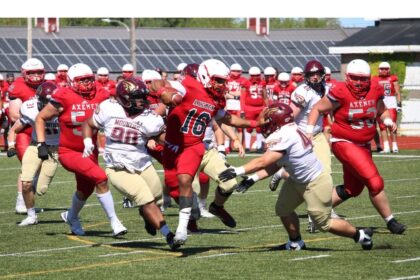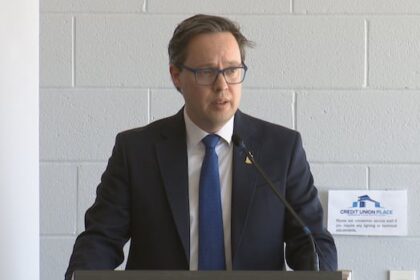ManitobaTwo university criminology professors suggest that police may drop tickets for friends and acquaintances more often than the public realizes, after a Winnipeg police constable pleaded guilty to ticket-fixing and a range of other offences last week.Ticket-fixing in Winnipeg may be ‘more prevalent’ than known due to ‘1950s-based’ ticket system: researchersBryce Hoye · CBC News · Posted: Nov 14, 2025 6:00 AM EST | Last Updated: 4 hours agoListen to this articleEstimated 6 minutesThe audio version of this article is generated by text-to-speech, a technology based on artificial intelligence.A file photo shows a driver using a cellphone. In one of a dozen examples of ticket-fixing by Winnipeg police Const. Elston Bostock, he arranged for another officer to drop a contact’s distracted driving ticket in exchange for a gift card. (LM Otero/The Associated Press)A driver texts a friend on the police force a photo of his freshly issued pink ticket for distracted driving, as red and blue lights flash in his rear-view mirror.That police constable friend contacts the ticketing officer, who agrees to not file the paperwork with the courts. In exchange, the driver gives his police constable friend a $20 Tim Hortons gift card, which he in turn provides to the ticketing officer.Winnipeg Police Service Const. Elston Bostock routinely engaged in ticket-fixing like this for acquaintances before an internal investigation last year revealed a pattern of corrupt practices — including an instance in 2019 similar to the above example detailed in court documents.”If a justice system does not want itself to fall into disrepute, it has to create certain kinds of safeguards … that have been implemented in other places to address ticket-fixing in particular,” said Kevin Walby, a criminal justice professor at the University of Winnipeg.”It’s interesting because they [the Winnipeg Police Service] have digitized other aspects of their information flows, they have engaged in computerization of other aspects of policing, but isn’t it curious that on the ticket side of things, they’re still using this 1950s-based technology.”Walby and others suggest ticket-fixing may be more common than people think, and that the latest case raises broader issues of trust around the Winnipeg Police Service.The police force declined to explain what it has done to prevent ticket-fixing following its own professional standards unit investigation into Bostock in 2024. The service wouldn’t answer general questions about what ticket-fixing safeguards it has in place.Const. Elston Bostock, who has been with the Winnipeg Police Service for over 20 years, has pleaded guilty to offences including obstruction of justice. (Submitted)Police also declined to confirm whether other officers implicated in Bostock’s case remain employed by the service or have faced penalties.”Chief Gene Bowers has indicated he will be willing to speak to changes being made, or those that have already been made, at the conclusion of the court process,” a Winnipeg police spokesperson said in an email Thursday.Bostock, a 22-year Winnipeg police member, pleaded guilty to attempting to obstruct justice and other offences last week and is expected to serve time in prison. He was among three Winnipeg officers charged last year.He still faces federal drug charges.Provincial legislation came into effect in 2016 enabling police departments to transition to electronic traffic ticket systems.Manitoba RCMP migrated to an e-ticketing system over a decade ago that, in theory, makes it more difficult to get away with the kind of paper-based ticket-fixing Bostock and some peers did in at least 12 cases, according to court documents.In the RCMP e-system, a Mountie scans the licence of someone they’ve pulled over, inputs information for the ticket into a computer in the cruiser, then uploads the ticket to RCMP and provincial databases simultaneously.After that, “the officer cannot retract or modify this ticket,” a Manitoba RCMP spokesperson told CBC News. WATCH | RCMP issue traffic tickets (2022):If a Mountie cancels a ticket, “the system then asks a series of questions such as why the ticket was cancelled and if another one was issued instead,” the spokesperson said in an emailed statement.”This could happen if the officer made a mistake on the ticket,” the spokesperson said.”If an officer wishes to have a ticket cancelled once it is downloaded, they need to consult with a Crown attorney.”High volume, hard to detectSeveral municipal police forces across Canada have switched from paper to electronic traffic ticketing systems in recent years, including the B.C. police departments in Vancouver, New Westminster and Delta.Tandeep Sidhu, an assistant professor in sociology and criminology at the University of Manitoba, said while digital systems may be less susceptible to ticket-fixing, they may not be foolproof.”It’s more prevalent than we may think, and the reason why it’s difficult to detect is because the high … number of tickets that are given,” Sidhu said.”There [is] such a large volume of data that it’s difficult to parse through, even from an investigative standpoint, for the police to be able to uncover these things internally.”Police headquarters in downtown Winnipeg. (Tyson Koschik/CBC)Sidhu said the Winnipeg Police Service faces a “crisis of legitimacy,” and the Bostock case doesn’t “help the police establish a relationship with the community.”‘Trying to leverage status’Despite the potentially career-ending consequences of getting caught, many of the instances of ticket-fixing in Bostock’s case show he arranged for relatively nominal gifts for officers who dropped tickets at his request — bottles of booze, $25 gift cards, a free car wash coupon.”They’re trying to leverage status as officers for some kind of gain, but it’s not big-time financial gain, it’s not big-time status gain. It’s for these little trinkets,” Walby said.”It’s a very interesting case study in what status actually means in a social network…. It’s about just having this position in a network where you are the deal-maker.”Walby pointed to a high-profile local case from the 1980s he referred to as “ticketgate,” where more than a dozen lawyers, magistrates, civil servants and judges were implicated in a ticket-fixing scandal.In the end, one judge and one magistrate were convicted on obstructing justice offences and forced to resign in 1988. WATCH | From the CBC Archives — 18 charged in Manitoba ticket-fixing in 1988:CBC Archives | 18 charged in Manitoba ticket-fixing in 1988A judge and magistrate pleaded guilty in 1988 to obstruction of justice and other offences in a ticket-fixing scandal in Manitoba.Walby said the latest case warrants an independent assessment or public inquiry, something U of Manitoba associate professor of law Brandon Trask has also suggested.”We don’t really focus a lot on police corruption in Canada, because there’s such this idea that police are noble figures — they are these kind of guardians of society,” Walby said.”It might be time … that we need to look more carefully at police corruption” in the Winnipeg Police Service, he said. “There’s enough here to say there is a leadership and culture problem at WPS that WPS can’t be trusted to fix.”
Thursday, 5 Mar 2026
Canada – The Illusion
Search
Have an existing account?
Sign In
© 2022 Foxiz News Network. Ruby Design Company. All Rights Reserved.
You May also Like
- More News:
- history
- Standing Bear Network
- John Gonzalez
- ᐊᔭᐦᑊ ayahp — It happened
- Creation
- Beneath the Water
- Olympic gold medal
- Jim Thorpe
- type O blood
- the bringer of life
- Raven
- Wás’agi
- NoiseCat
- 'Sugarcane'
- The rivers still sing
- ᑲᓂᐸᐏᐟ ᒪᐢᑿ
- ᐅᑳᐤ okâw — We remember
- ᐊᓂᓈᐯᐃᐧᐣ aninâpêwin — Truth
- This is what it means to be human.
- Nokoma











